Why some soap-makers refuse to use palm oil and how you can help them
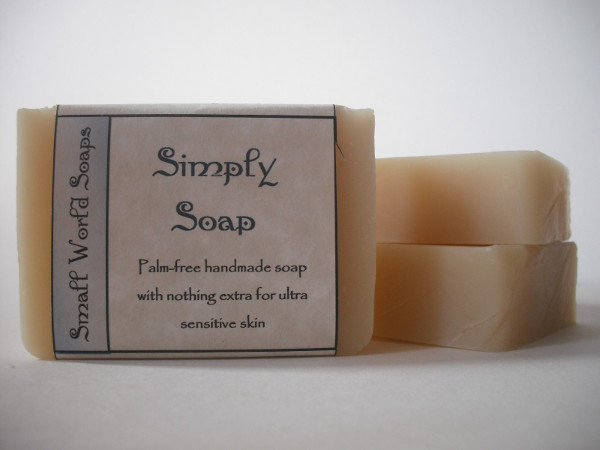
Lowimpact.org: Hi Katrina – you make and sell soaps that don’t contain any palm oil. We wanted to talk to you about why you came to that decision, and what you use instead. To start, what is palm oil used for in soap making?
KM: It’s a vegetable oil, and vegetable oils are the main ingredient in soap – they form the bulk. Soaps used to be made with animal oils – like tallow from cows, or lard from pigs. Almost all soap is made with vegetable oils nowadays, firstly because I don’t think people like the idea of animal fat in their soap, and secondly, it’s very difficult for people making and selling soap to pass the necessary safety assessments if using animal fats
Lowimpact.org: Why is palm oil so popular?
KM: It’s a very good oil to use – it makes a creamy soap, with a good lather, and it’s easy to obtain. But mainly it’s because it’s cheap.
Lowimpact.org: So what’s the problem?
KM: There’s been an explosion in the use of palm oil in the last decade – not just for soaps, but also for processed foods, cosmetics and biofuels. Importing palm oil didn’t cause much of a problem when it was just for soap-making, but now many companies, notably in sout-east Asia, are trying to meet the demand by removing rainforest for palm oil plantations, which threatens endangered species like the orang-utan and the Sumatran tiger. Peatlands are also being planted with oil palms, and although they don’t contain as much biodiversity as rainforests, they hold a lot of carbon, which is released when the land is cleared, helping to accelerate climate change. And yet another problem is that in some places, notably Colombia, small farmers are being violently forced off their land to make way for palm plantations. Biofuelwatch document the problems caused by appropriating land previously used for food or wildlife to produce road fuel.
Lowimpact.org: What alternatives are there?
KM: You have to be careful – for example, I don’t make cream soaps at the moment, because they contain stearic acid. After a bit of research I found that almost all stearic acid comes from palm oil as well. If anyone knows any reliable sources of stearic acid other than palm oil, I’d be interested to know.
Lowimpact.org: What do you use in your soaps rather than palm oil?
KM: A combination of different oils, including coconut, soybean, rapeseed, olive and avocado. I realise that some of these ingredients (apart from rapeseed oil) have to come a long way, and that there is also a problem with rainforest removal when it comes to soybean production – so I have to be careful there. And of course, most of those oils have to be transported large distances, which isn’t ideal.
Lowimpact.org: Are there any oils for soap-making that can be produced locally?
KM: There are not many in the UK – rapeseed being the exception. I’m looking into that more, as well as keeping an eye open for any new ideas. For example, it would be good to be able to get a safety assessment for small soap-makers using animal fats – and people can make their own decisions about whether they want to buy it or not. Avocado and olive oil is produced much closer to the UK than palm oil, however.
Lowimpact.org: What can people do to help?
KM: Boycott products containing palm oil – although this can be tricky, as it’s often labelled just as vegetable oil. Buy soaps that are labelled as palm-oil free of course – like mine for example (but I would say that, wouldn’t I?). You can also search online for palm-free soap producers near you. Remember that hand-made doesn’t necessarily mean palm oil free, and although palm-free soaps will be a bit more expensive, it will mean that you’re not contributing to the destruction of rainforest.
The views expressed in our blog are those of the author and not necessarily lowimpact.org's




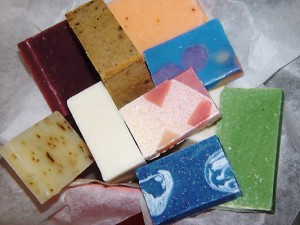 Starting your own business: how to sell hand-made soaps
Starting your own business: how to sell hand-made soaps
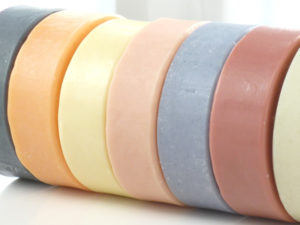 Why the ‘natural’ in natural soaps is so important
Why the ‘natural’ in natural soaps is so important
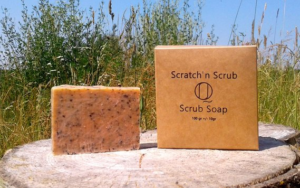 Why natural soap is naturally better, for your skin and for the planet
Why natural soap is naturally better, for your skin and for the planet
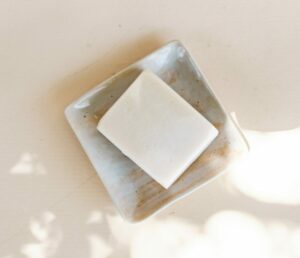 Looking for a simple cold process soap recipe without palm oil? Look no further, here’s one of our favourites!
Looking for a simple cold process soap recipe without palm oil? Look no further, here’s one of our favourites!
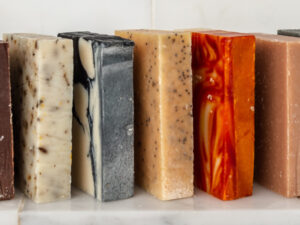 Natural soaps
Natural soaps


